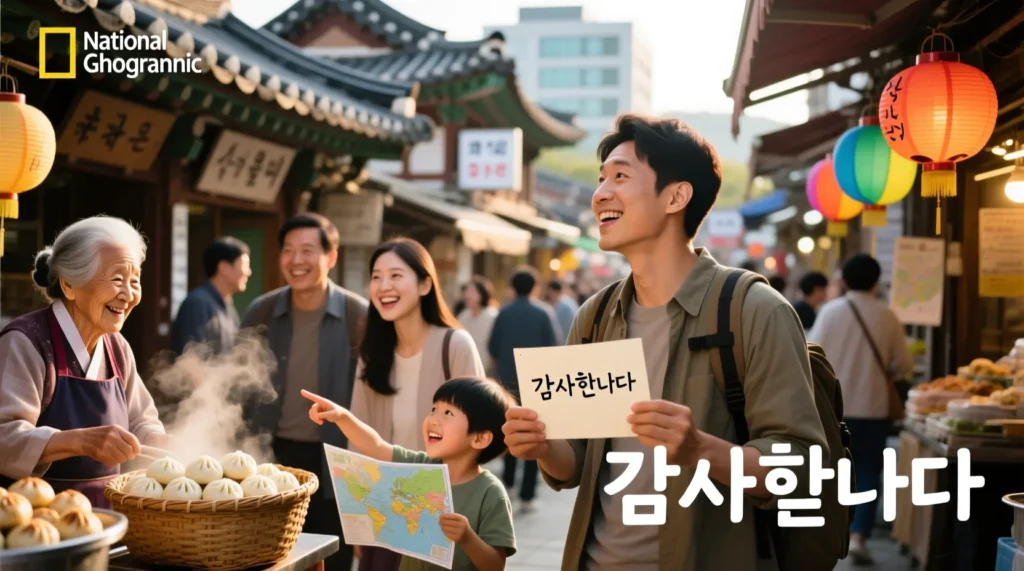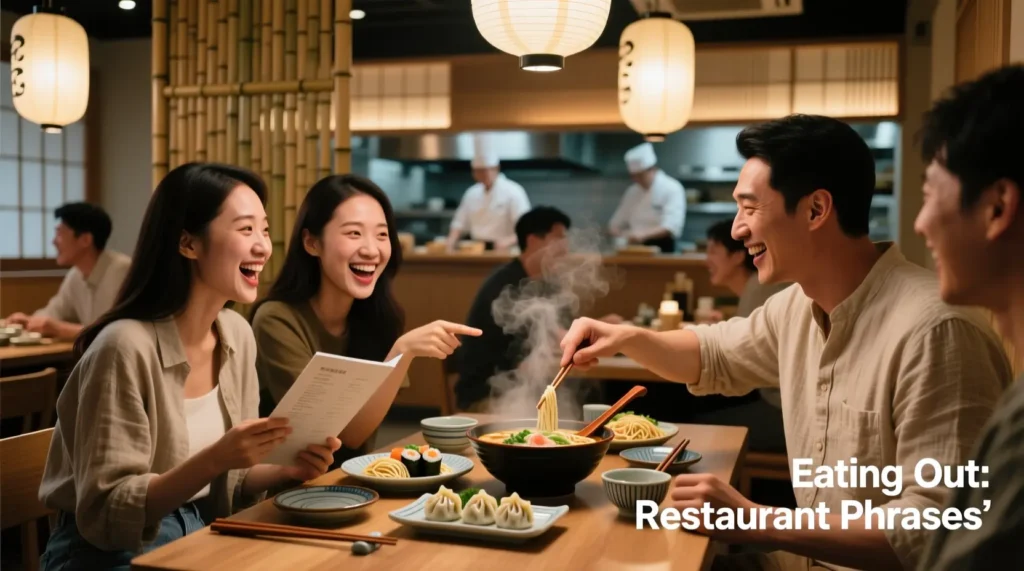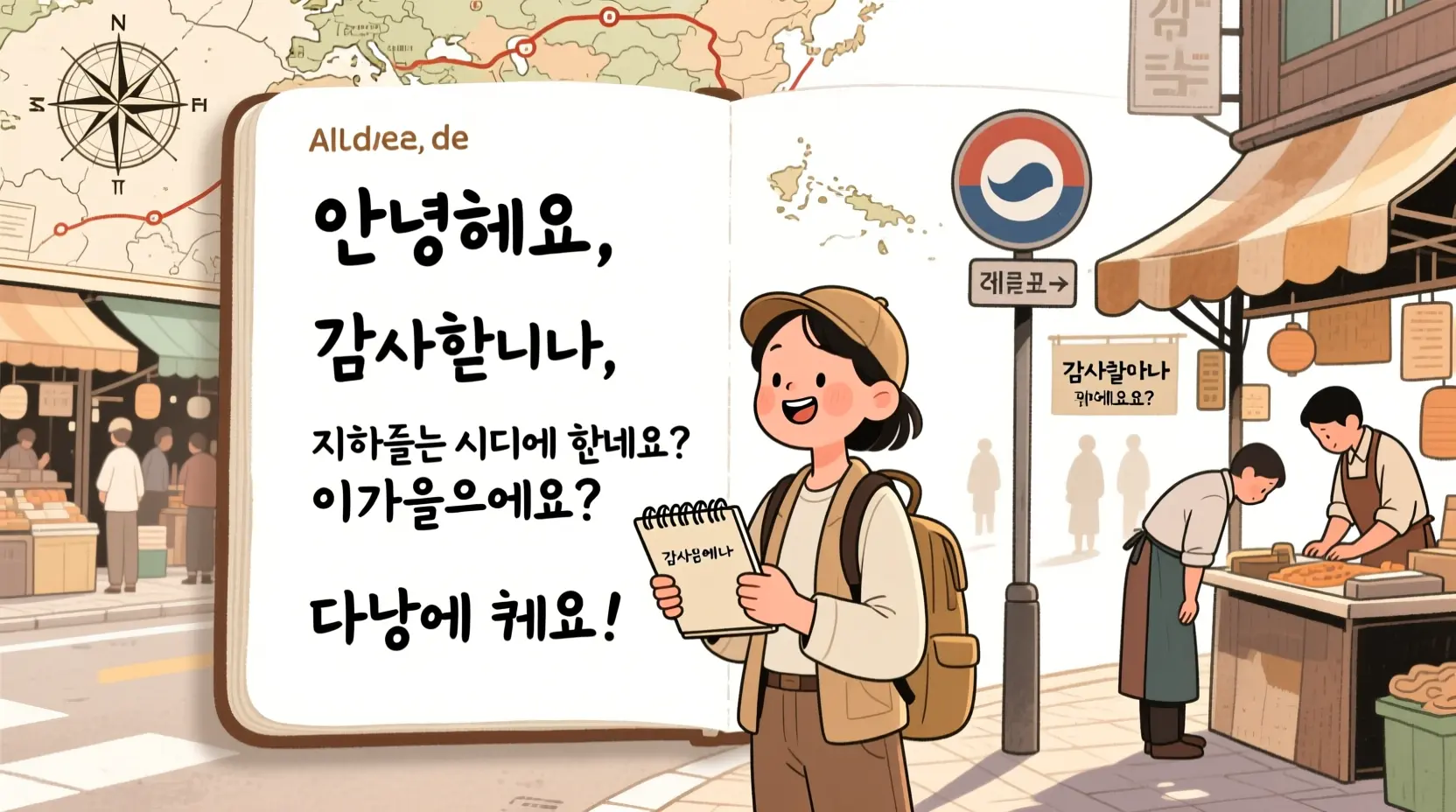Traveling to South Korea can be an unforgettable adventure.
From bustling cities like Seoul to tranquil temples in the countryside, Korea offers experiences that are rich in culture, food, and history.
But let’s face it navigating a country where you don’t speak the language can be intimidating. That’s where Korean phrases for travel come in!
If you’re ordering delicious street food, asking for directions, or making new friends, knowing the right phrases can make your trip smoother, safer, and more enjoyable.
Learning a few simple expressions can open doors, build connections with locals, and give you the confidence to explore beyond tourist hotspots.
In this guide, we’ll cover essential phrases, categorize them for easy use, and give practical examples so you’ll feel like a local in no time.
Why Knowing Korean Phrases for Travel Matters 📝

Understanding some key Korean phrases for travel is more than just convenience it’s a way to show respect for local culture, communicate effectively, and avoid common misunderstandings.
Imagine trying to order your favorite Korean dish, but the cashier doesn’t understand you. A small phrase like “이거 주세요” can make all the difference.
Practical benefits include:
- Safety: Asking for help, directions, or understanding signs.
- Ease of Travel: Booking hotels, using public transport, or shopping.
- Social Connection: Locals often appreciate when visitors make an effort to speak their language.
Even if you’re a beginner, learning short, useful phrases allows you to navigate daily situations confidently and enrich your travel experience.
Basic Greetings and Polite Phrases 👋

Knowing how to greet people is the first step in making a good impression.
Hello – 안녕하세요 (Annyeonghaseyo)
Use When: Meeting someone for the first time or greeting store staff.
Example: Entering a café: “안녕하세요!” (Hello!)
Thank You – 감사합니다 (Gamsahamnida)
Use When: Receiving a service, gift, or assistance.
Example: After paying for lunch: “감사합니다!” (Thank you!)
Excuse Me – 실례합니다 (Sillyehamnida)
Use When: Getting someone’s attention or passing through a crowd.
Example: Trying to ask a shopkeeper for directions: “실례합니다, 화장실 어디에 있어요?” (Excuse me, where is the restroom?)
Sorry – 죄송합니다 (Joesonghamnida)
Use When: Accidentally bumping into someone or apologizing.
Example: “죄송합니다, 제가 길을 막았어요.” (Sorry, I blocked your way.)
Getting Around: Transportation Phrases 🚇
Traveling across Korea is convenient but can be confusing without the right phrases.
Where is…? – … 어디에 있어요? (… Eodie Isseoyo?)
Use When: Asking directions.
Example: “지하철역 어디에 있어요?” (Where is the subway station?)
How much is the fare? – 요금이 얼마예요? (Yogeumi Eolmayeyo?)
Use When: Using taxis or buses.
Example: “택시 요금이 얼마예요?” (How much is the taxi fare?)
Ticket – 티켓 (Tiket)
Use When: Buying a ticket for bus, train, or events.
Example: “서울행 티켓 하나 주세요.” (One ticket to Seoul, please.)
I want to go to… – …에 가고 싶어요 (…e Gago Sipeoyo)
Use When: Telling drivers or staff your destination.
Example: “인사동에 가고 싶어요.” (I want to go to Insadong.)
Eating Out: Restaurant Phrases 🍲

Food is a huge part of the Korean experience, so knowing key phrases is essential.
Menu, Please – 메뉴 주세요 (Menu Juseyo)
Use When: Asking for a menu.
Example: “메뉴 주세요.” (Menu, please.)
I’m Allergic to… – … 알레르기 있어요 (… Allereugi Isseoyo)
Use When: Informing staff about allergies.
Example: “땅콩 알레르기 있어요.” (I’m allergic to peanuts.)
Delicious! – 맛있어요 (Mashisseoyo)
Use When: Complimenting food or thanking the chef.
Example: “이 김치찌개 맛있어요!” (This kimchi stew is delicious!)
Check, Please – 계산서 주세요 (Gyesanseo Juseyo)
Use When: Asking for the bill.
Example: “계산서 주세요.” (Check, please.)
Shopping Phrases 🛍️
Korea has vibrant markets and malls. These phrases help you shop confidently.
How much is this? – 이거 얼마예요? (Igeo Eolmayeyo?)
Use When: Asking the price of an item.
Example: “이 가방 얼마예요?” (How much is this bag?)
I’ll take it – 이거 살게요 (Igeo Salgeyo)
Use When: Confirming your purchase.
Example: “이거 살게요.” (I’ll take it.)
Do you have…? – … 있어요? (… Isseoyo?)
Use When: Asking for availability.
Example: “다른 색 있어요?” (Do you have another color?)
Emergencies and Safety Phrases 🚨
Safety always comes first. Learn these essential phrases.
Help! – 도와주세요! (Dowajuseyo!)
Use When: In danger or needing urgent help.
Example: “도와주세요! 길을 잃었어요!” (Help! I’m lost!)
Call the police – 경찰 불러 주세요 (Gyeongchal Bulleo Juseyo)
Use When: Reporting an emergency.
Example: “경찰 불러 주세요, 도둑이에요!” (Call the police, it’s a thief!)
I need a doctor – 의사 필요해요 (Uisa Piryohayo)
Use When: Medical emergency.
Example: “의사 필요해요, 다쳤어요.” (I need a doctor, I’m injured.)
Cultural Phrases and Small Talk 💬
Engaging with locals can be rewarding when you know some cultural phrases.
Nice to meet you – 반갑습니다 (Bangapseumnida)
Use When: Meeting someone new.
Example: “안녕하세요, 반갑습니다.” (Hello, nice to meet you.)
Where are you from? – 어디서 오셨어요? (Eodiseo Osyeosseoyo?)
Use When: Making conversation.
Example: “어디서 오셨어요?” (Where are you from?)
I like Korea – 한국 좋아해요 (Hanguk Joahaeyo)
Use When: Expressing admiration for the country.
Example: “한국 음식 좋아해요!” (I like Korean food!)
Bonus Recap Table: Quick Reference 📝
| Category | Phrase | Example Scenario |
|---|---|---|
| Greetings | 안녕하세요 (Hello) | Greeting a café staff |
| Transportation | … 어디에 있어요? (Where is…?) | Asking directions |
| Eating Out | 메뉴 주세요 (Menu, please) | Ordering at a restaurant |
| Shopping | 이거 얼마예요? (How much is this?) | Buying souvenirs |
| Emergencies | 도와주세요! (Help!) | Lost in a busy street |
| Cultural / Small Talk | 반갑습니다 (Nice to meet you) | Meeting new friends |
Final Thoughts: Make Your Trip Unforgettable 🌏
Learning these Korean phrases for travel doesn’t require fluency.
A few words can boost your confidence, ease communication, and leave a positive impression on locals. Start with greetings, restaurant phrases, and transportation basics.
Practice pronunciation, carry a small phrasebook or app, and don’t be afraid to try even a small effort is appreciated.
With these phrases, your Korean adventure will be smoother, safer, and more memorable.

At QuickReply.com, speed meets smart communication! Instantly craft perfect replies, boost engagement, and save time. Your go-to hub for quick, witty, and professional message responses anytime!

Leave a Reply